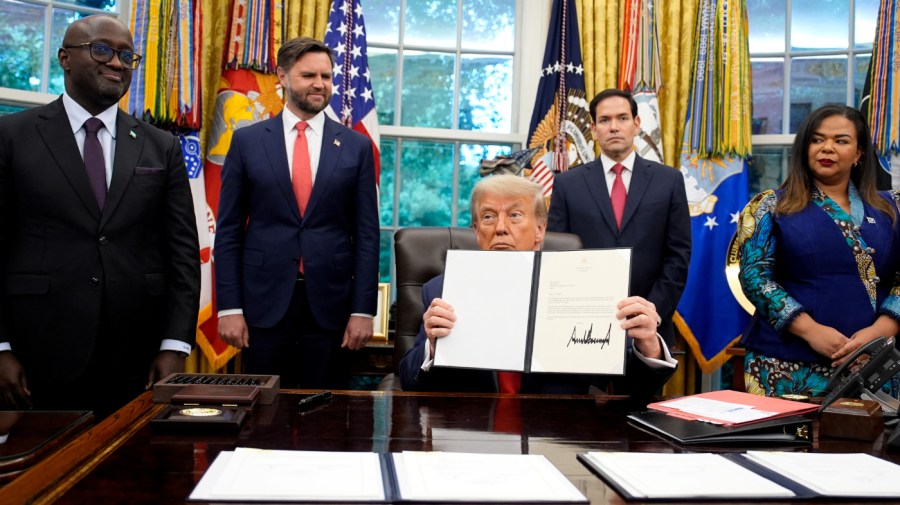As Congo moves toward peace, US aid vanishes

After decades of brutal conflict, I was encouraged by President Trump’s recent announcement of a new peace agreement in the Democratic Republic of Congo.
Joined in the Oval Office by the foreign ministers of Rwanda and Congo, he outlined a plan to end a war that had killed 7,000 people in just the first two months of this year, with hundreds of thousands more displaced. It was a welcome surprise — and a necessary start.
I have seen the cost of this conflict up close. In 2016, I boarded a United Nations helicopter headed to a rural village along the Rwanda-Congo border. The only thing standing between the villagers and a looming militia attack was a ring of U.N. peacekeepers.
As we prepared to depart, a woman approached and begged me to take her with us. She was terrified that the peacekeepers would leave. That moment has never left me.
Today, the U.N. peacekeeping mission in Congo is still the only line of defense for thousands of civilians caught in the crossfire. With more than 13,500 total personnel on the ground, the mission is being pushed to the brink as the Rwandan-backed M23 rebel movement sweeps across eastern Congo, seizing major cities like Goma.
But between the combatants and the civilians, U.N. peacekeepers remain in place, still doing their job.
That job just got harder — and more important. The peace agreement announced in Washington sets a 30-day deadline for a regional security framework and a 90-day deadline for economic integration.
In theory, the Congolese government will demobilize the Rwandan-aligned Democratic Forces for the Liberation of Rwanda militia, while Rwandan troops withdraw from Congolese territory.
But diplomacy is only one piece of the puzzle. That’s where the U.N. peacekeeping mission comes in.
Peace on paper means little without implementation. The U.N.’s top diplomat in the region, Bintou Keita of Guinea, is well positioned to pressure all sides to follow through. And the peacekeeping mission — with its deep local presence and relationships — will be critical to brokering trust, verifying compliance and responding quickly to any resurgence of violence.
In fact, it already is. In June, the U.N. helped facilitate a cease-fire in Ituri Province, signed by six armed groups — a quiet but meaningful victory.
This was an important step in quelling violence from other rebel factions operating in eastern Congo, including the Ugandan Allied Democratic Force, with ties to both regional and international Islamic terrorist networks.
Still, critics have long called for the U.N. peacekeeping mission’s closure. At nearly $1 billion annually, it is one of the U.N.’s most expensive missions. Its mandate is sprawling. The Congolese government has also called for a drawdown of forces. That process is already underway, with South Kivu formally returning to Congolese control in April 2024.
But a joint U.N.-Congolese review last fall showed that key security benchmarks remain unmet. Military units lack readiness. Courts are understaffed. Demobilization efforts are lagging. Pulling funding now would be like taking the parachute off a skydiver mid-descent.
Yet that’s exactly what’s happening.
On Capitol Hill, lawmakers passed a White House rescissions package that slashed funds for U.N peacekeeping, including efforts in the Congo. The cuts bypassed the normal appropriations process, raising alarm on both sides of the aisle. Sen. Patty Murray (D-Wash.) called it “an illegal end-run around Congress.”
Others warned it sets a dangerous precedent — gutting foreign policy programs without legislative oversight.
The strategic stakes are enormous.
China has steadily increased its funding and troop contributions to U.N. peacekeeping, positioning itself as a global security stakeholder. If the U.S. walks away from missions like the U.N. peacekeeping mission in Congo — especially in a resource-rich region where rare earth minerals are shaping the geopolitics of the future — it risks ceding both influence and credibility.
Moreover, withdrawing now would all but guarantee a wider humanitarian disaster as refugees flood into Congo’s nine bordering nations. Armed factions, as history shows, are rarely far behind — exporting conflict across Central Africa.
Peacekeeping isn’t just about boots on the ground. It is about presence. In remote villages and war-torn cities, blue helmets are often the only sign that the international community is still watching — that someone will step in when the government cannot, when the militias return and when peace starts to fray.
Earlier this year, Office of Management and Budget officials defended rescissions as a cost-saving measure. But what’s the cost of failure in Congo? What’s the cost of walking away from a peace process the U.S. helped broker?
The woman at the border that day didn’t know the name of the mission. She didn’t care about budgets or congressional procedures. She just knew that those in blue offered safety.
Peacekeeping isn’t charity, it’s strategy.
It offers unparalleled legitimacy, shares the burden with allies and costs far less than war. And at $1.50 per American per year, it remains one of the most cost-effective investments in global stability the U.S. can make.
The president is understandably proud of the peace agreement the U.S. brokered. Support of U.N. peacekeeping is one way to help it succeed.
Peter Yeo is the president of the Better World Campaign.